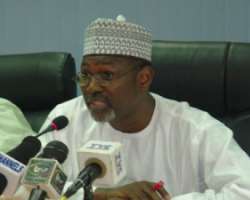INEC'll adopt new strategies for rural, illiterate voters: Jega

The Independent National Electoral Commission (INEC) has said that different strategies and platforms will be deployed to educate voters especially rural and illiterates electorates in the run up to 2015 elections.
Chairman, of INEC, Prof. Attahiru Jega, said that the electoral commission had put in place measures to enhance capacity of its staff.
He spoke Monday in Abuja at a four-day workshop organised by the United States Embassy for INEC Public Affairs officers with the theme “The Role of INEC Press Officers: Enhancing Good Governance Through Media and Grassroots Outreach.”
Jega said, “It resonates with our thinking that the commission needs to reach out to a majority of our people who live in the rural areas, who are largely illiterate and who need to be educated about the electoral process in an elaborate, clear and sustained manner.
“We think that different stategies and platforms need to be deployed to reach out to them rather than the elitist and high brow ones we are used to.”
The INEC boss further that the efforts at building the capacity of staff were informed by the fact that well trained staff would most likely to exude confidence and to perform their tasks competently.
Jega commended the United States government for providing lead facilitator for the workshop in person of Derwin Johnson.
In his remark, the United States Ambassador to Nigeria, James Entwistle, argued that that the training was part of the United States' support to INEC and Nigeria for all upcoming elections, including the national ones in 2015.
The ambassador stressed that the US supports free, credible, inclusive and peaceful process in which democratic principles are adhered to by all parties, candidates and institutions.
He said, “You're well aware that the U.S. supports a free, credible, inclusive, and peaceful electoral process in which democratic principles are adhered to by all parties, candidates, and institutions. This process encompasses all stages in the run-up to elections, including preparation of voter rolls, running campaigns, conducting the actual election, and handling any problems immediately afterwards. We support an election process that protects the rights of Nigerians to use the ballot box to reflect the views and concerns of their communities—a process that helps produce a stable, democratic government regardless of which candidate wins.
“The key word there is process, because that's what you're there to protect the integrity of. Public affairs officers help shape public knowledge and perceptions about elections and the debate process, and provide crucial information on voters' rights and the voter registration process. What you do is vital to creating an informed electorate that knows where it needs to go and what it needs to do to cast the ballot. The better informed the public is of their rights and responsibilities, the better the elections will be. Better elections drive more legitimate candidates to the forefront, and this positive momentum continues forward. You're vital to this, and it's why we're committed to providing these trainings.”
He congratulated INEC as well as the many other electoral stakeholders, on the successful elections in Ekiti in June
